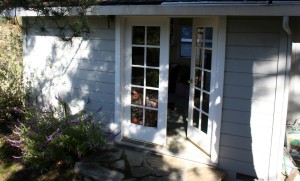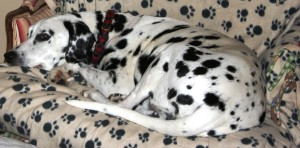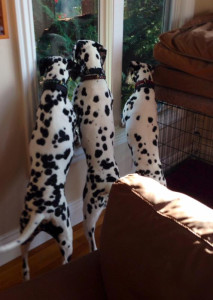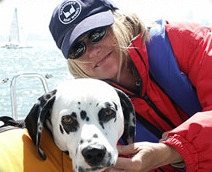Sometimes life sends us curveballs. Just when we are least expecting it, a new situation arises, be it good or bad, and we are left scrambling.
Not so long ago, I was talking with a friend whose older sister had died suddenly quite some time ago, and who was having difficulty coming to terms with it. His loss had affected our friendship, and I said at last: “She died thirty years ago! When are you going to get over it?”
In retrospect, I realized that this was a tremendously callous remark, even though I was frustrated by the ways in which we had become so distant. I craved the return of the man I knew so well and our emotional intimacy, as well. I spoke my mind—and then wished I hadn’t.
In the past few months, I, too, have found myself confronting the death, an abrupt one, of someone I loved intensely: my beloved Dalmatian, Gulliver, whom I miss even more than I miss many of the people in my life who have passed—though it seems odd, and perhaps disrespectful—to reveal this. I wrote of him more than a year back in one of my most popular newsletters, (“Remember Heart Dogs You Have Loved), and addressed the purity of all our relationships with dogs, and the way they offer so much to us everyday while asking absolutely nothing in return. Thirteen months ago, I believed that I had “come to terms” with Gulliver’s death in 2010. How wrong I was.
Before he went to the Rainbow Bridge, Gulliver and I made our way, every day of the week, down the steep hill leading to my cottage, where I had done all my writing since moving to this house in 2002. For eight years, he curled up in the chair next to my desk and with his presence and protection reassured me that I could conquer the next word, the next chapter, the next book.

To write and create with honesty means that you must strip yourself down and offer yourself up to your readers, put your soul out in the world and allow yourself to be naked for all to see. And you must sometimes deal with the aftermath: perhaps family members who wish you had not written with such candor, or reviews that find your writing wanting, or an audience who is disappointed with what you have tried, and perhaps failed, to communicate.
Gulliver’s love reminded and reassured me that it was, indeed, my mission to try and communicate my feelings and ideas with a public I could not see. With calmness and wisdom, he encouraged me to do what my mother had always counseled, to “tell it true,” and to do so without reservation.

But more than five years ago, he left me, and I had to face all this alone. Without understanding why, I found myself avoiding the place where we had worked together. For the last five years I have sat with my laptop at the kitchen island, a very uncomfortable spot in which to work, rather than making the trek down the hill. I miss my ergonomic desk chair, but I do not miss the empty space where Gulliver once slept. Over the years, my husband asked me again and again why I was working at the kitchen counter, but I only made excuses.
When I began my current novel, I forced myself to go down to the cottage again, trying to make a new start, accompanied by Breeze, Mac and Cody. To my distress, however, they did not lie down and chew their bones in support and silence, but rather wanted to race in and out the door to chase squirrels or lizards.

In desperation, I installed a dog door in the cottage, hoping that they would let themselves in and out so that I could work in peace, but only Cody learned how the door worked. (I always said he was a smart one!) Breeze was afraid to push through it and just stood there whining, and it seemed beyond Mac’s little brain to understand that he had to manage it on his own without my helping hands. I retreated back to the kitchen where, in the mudroom nearby, an electronic dog door opened for them like magic.
And so, once again, I was stuck with my laptop crowded by the mess of mail and newspapers and empty coffee cups that seems to live on kitchen islands, and found myself reluctant to use the spacious desk in the cottage below, despite my resolutions. I simply told both my husband and myself that the dogs’ raucous behavior was the reason I was once again not venturing back.
Last week, however, a new friend had the perspective required to help me to understand what was actually bothering me. It was the loss of Gulliver, and his support, offered so unconditionally, that I obviously hadn’t put to rest, despite the five years that had passed. My reluctance had nothing to do with the inconvenience of dogs chasing squirrels, but rather with the fact that I had no one special to keep me company as I struggled with the paragraphs requisite for the new novel—a spotted dog who would simply sit with me in solitude each day, as I searched to find the words that sometimes eluded me.
A lot of people would say, as I had blurted to my friend, “it’s been five years! When are you going to get over it?” And I would answer, now, that I am still trying to work it all out. I am finally allowing myself to experience once again, perhaps more consciously at this point, the loss of my companion, the one who kept watch over my work and me during those hours in a place that was truly ours.
This introspection has enabled me to return to my desk—though sitting down every day continues to be difficult. To help, I have put a photo of him and me with our faces close together, his red leather collar hanging on the corner of its frame, just to the left of my computer screen. I can see us and remember our love whenever I look up at Mac, Cody and Breeze, as they romp through the yard beyond my window. Gulliver guards me, still.

I realize now that in order to put something painful behind me, or at least to make it manageable, I must reflect on it with honesty and thus empower myself to live with it. Lacking such recognition, I will always be crippled by sadness. Interestingly enough, surrendering to my emotions—be they good, bad or somewhere in between—rather than attempting to overcome them, is what enables me to move forward once again.
Author Brenè Brown says, “vulnerability is the best measure of courage.” It is not a sign of weakness. As I return to my cottage each day now, I look over at his chair and allow myself to cry for him once again, the dog whose eyes held the greatest measure of empathy, love and courage that I have ever encountered. Gulliver himself would never tell me to get over it, but rather advise me, with a Dalmatian smile, to get past it.
Yours,
Linda
Have a comment or feedback? Talk to Linda!

